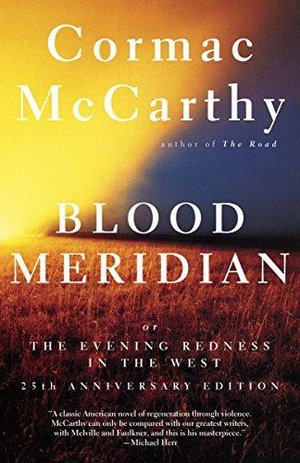
Virtually all of McCarthy’s idiosyncratic fiction (The Orchard Keeper, Child of God, Suttree) is suffused with fierce pessimism, relentlessly illustrating the feral destiny of mankind; and this new novel is no exception—though it is equally committed to a large allegorical structure, one that yanks its larger-than-life figures across a sere historical stage.
“The kid”—a Tennessee teenager—wanders aimlessly into the Texas Indian wars of the 1850s. First he’s taken on by a wandering troop of ex-American soldiers, planning its own raid into Mexico. Then, after thoroughgoing slaughter of the troops by the Indians, the kid survives to be recruited as a scalp-hunter in a band of Mexican-financed marauders—led by a madman named Glanton, along with his associate: The Judge, a hairless God-or-devil figure who is capable of great ingenuity (when the men run out of gunpowder, The Judge alchemizes a new batch) but who also indulges in eccentric sermons to explain his bloodthirsty brand of philosophy. (“If God meant to intrude in the degeneracy of mankind would he not have done so by now?…The way of the world is to bloom and to flower and die but in the affairs of men there is no waning and the noon of his expression signals the onset of night. His spirit is exhausted at the peak of its achievement. His meridian is at once his darkening and the evening of his days.”) McCarthy, even more than in previous novels, strains for prophetic, Bible-like tones here—with a cast of allegorical types (a judge, a fool, an ex-priest, the kid) and an archaic vocabulary that lurches from “kerfs” and “bedight” to “rimpled” and “thrapple.” But, though there’s something stubbornly impressive about McCarthy’s unwavering gloom, the novel’s unceasing slaughter sometimes suggests a spaghetti-western without a hero, all gore and blazing sun—while its stentorian, pretentious prose will quickly dissuade most readers from attempting to share McCarthy’s dark vision. (“He’d long forsworn all weighing of consequence and allowing as he did that men’s destinies are given yet he usurped to contain within him all that he would ever be in the world and all that the world would be to him and be his charter written in the urstone itself he claimed agency and said so and,” etc.). Grandiose, feverish, opaque. — Kirkus Reviews
Note: There is a movie being made based on this novel. If it follows the book closely I would suggest that you do not go see it.
In the Kirkus Review it is said that McCarthy uses ‘pretentious prose’ he also avoids using any punctuation and when rendering dialog likes to do so using Spanish whenever possible. He does break up the ‘gore and blazing sun’ somewhat with some very descriptive writing about the landscape, flora and fauna that the scalp hunter are passing through. However, even there he can not help himself and loads the descriptions with pretentious adjectives — either ignore them or treat the book as a vocabulary builder.